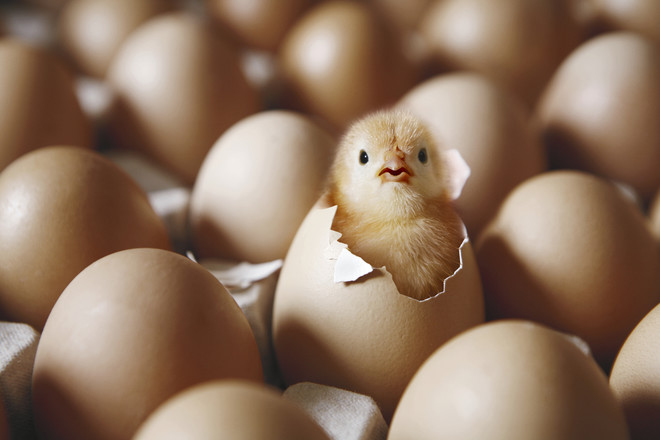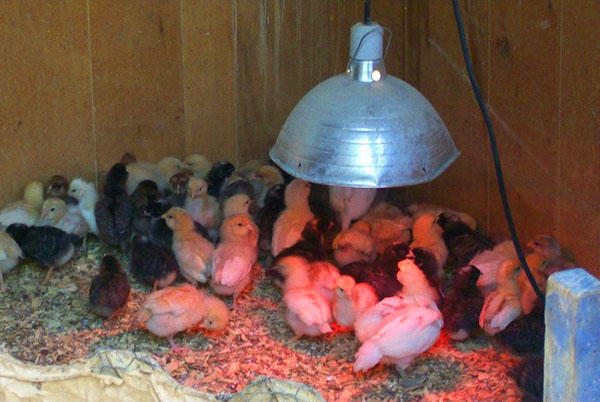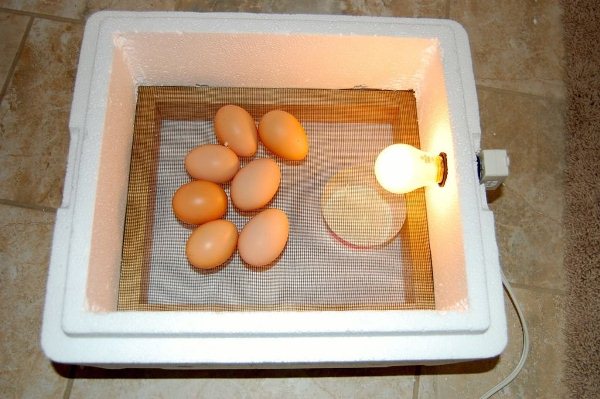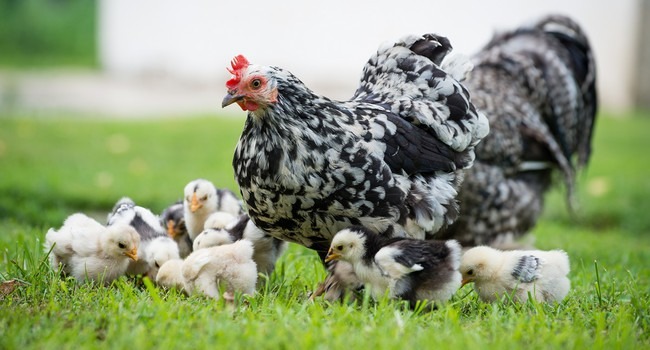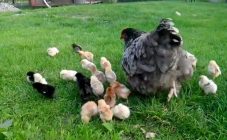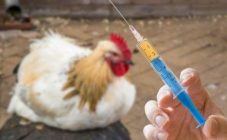Content:
Nowadays, many people choose to raise their own poultry. This allows you to save your budget, because you no longer have to buy meat and eggs in the store. But, on the other hand, this is a rather troublesome occupation. You always need to monitor what the babies eat and what are the conditions of detention. How to raise chickens correctly, few know.
Where to begin
Keeping chickens at home for beginners may seem difficult at first, but if you follow the recommendations, this activity will not be so difficult. The main thing is to figure out how to raise chickens, to choose strong individuals. Initially, a weak bird is not viable, losses cannot be avoided. Even the biggest show of concern will not fix it.
To answer the question of how to organize raising chickens at home from scratch, where to start, you just need to follow a certain algorithm.
The first week after hatching is the most important and crucial time for both chicks and layers and their owner. Daily young growth is susceptible to various diseases, plus digestive problems often arise due to mistakes in the selection of the diet. Therefore, during this period, great attention should be paid to a comfortable temperature for chickens, air humidity, lighting and ventilation of the room, the intricacies of feeding.
When the babies are dry, they can be transferred to a special device that will replace the hen. But if the farm already has an experienced chicken, then it is best to put the chickens under its wing. In any case, the room needs to be prepared. It should be dry and clean, ventilated, not too wet, but not overly dry. Before settling the young, the place needs to be treated with disinfectants, check the protection against pests, and provide equipment (feeders, drinkers, lamps, etc.). It is important that all devices are safe and that the number of chicks per square meter does not exceed 12 heads.
At the beginning of life, domestic chickens are very susceptible to hypothermia, as a result of which they can die. Therefore, it is very important to monitor the temperature conditions in the room. For the first 24 hours, it is necessary to create conditions close to the atmosphere of the incubator. The thermometer should be at least +35 degrees. Later this mark can be lowered to +31. Grown up young animals feel comfortable even at +21 degrees.
To correctly determine the state of the chicks, it is enough just to look at them carefully and analyze their behavior. If they are huddled together under the lamp, then they are freezing. If they push their feathers and huddle closer to the ground, they are hot.
It is also important to provide the chicks with sufficient light. At first, the lamps in the coop are not turned off at all, thereby pushing the birds to an active lifestyle, when they can eat a lot, move and grow. Then they take a break for 15 minutes. When the chicks are completely comfortable and grow up a little, the daylight hours in the house should be gradually shortened to their natural duration.
How to plant chickens without an incubator and hen
For a novice poultry farmer, the question of how to breed chickens without an incubator and a brood may seem strange. After all, these methods are the most common, and it seems that there can be no other options. But this is not the case. You can actually help the chicks to be born on their own.For this, a so-called impromptu maternity hospital for birds is usually made.
One of the popular options is with a heating battery and a cardboard or plywood box. The length of the latter depends on the size of the battery, the height of the walls must be at least 20 cm. The bottom must be covered with a soft dense cloth. In the middle of the original incubator, be sure to put a jar of water. Then, all the remaining space is filled with fresh chicken eggs.
The box should be covered with cardboard with pre-cut holes for ventilation. It is important not to overcool future chickens and warm eggs evenly from all sides. To do this, they need to be turned over periodically. In order to avoid confusion, it is recommended to make a few marks on the shell. The temperature inside the box should always be kept at +35 degrees, except for periods of cooling.
Before the chicks hatch, the shell must be moistened with water. To do this, from the 19th to the 21st day of incubation, eggs are sprayed every 5 hours. As soon as the babies begin to hatch, you need to close the lid of the box, plug the holes and wait for the chicks to appear.
Another proven way to grow chicken from an egg is to incubate with a box and a lamp.
It will require the following materials:
- box;
- thermometer;
- soft tissue;
- lamp with an extension cord;
- cardboard and glass sheet of the same size;
- a jar of water.
The bottom of the box is covered with a cloth in the same way. A thermometer is placed on one side, water on the other. A hole for the lamp is prepared in a sheet of cardboard and mounted there, connected to the network.
From above, the box is covered to the middle with cardboard on one side and glass on the other. In this case, the air inside should warm up to +37 degrees.
Feeding chicks
Proper nutrition that is age and appropriate for the body is the basis for good health and development of chickens. For the first time, they need to be fed within a few hours after hatching. The sooner the chicks get food, the sooner they will be able to adapt to the changed environment. As a rule, they themselves begin to look for food 8 hours after birth. For the first 4 days, only light, low-fat food should be given, gradually introducing new ingredients. Millet is usually the first additive. Groats should be crushed and thermally processed.
Feeding chickens at home involves more than dry food. It is necessary to enrich the diet with herbs, sour milk products, mineral supplements and potatoes. The same greens can be added to the menu from the very first days.
Experts recommend using the following list of herbs and vegetables:
- Clover.
- Green onions contain beneficial phytoncides, fiber, and many vitamins and minerals.
- Carrot.
At an early age, the body of chickens is very much in need of protein. To ensure a sufficient amount of it, cottage cheese, yogurt, whey, etc. are added to the wet feed and to the grain. From the fifth day, the chicks are allowed to give fine gravel, shells, chalk. There will be no extra feeding from crushed bone remnants, meat scraps and earthworms. It will provide young broilers with animal protein.
Chicks do not always appear in the warm season, when the earth is generous with gifts. Sometimes greenery is simply not enough. Then a special feed mixture comes to the rescue, which specialists develop taking into account all age characteristics of the bird. There are 3 types of such compound feed: starting, growth and finishing. The difference between them lies in the composition and size of the fractions.
It is necessary to periodically carry out the prevention of intestinal infections. To do this, the chicks are given a little potassium permanganate and all the poultry dishes are washed with this solution.
Chick care rules
Breeding chickens at home is a laborious job. In addition to the correct diet, a lot of attention should be paid to the activity and healthy development of birds. If some individuals were seen weak, less energetic, poorly gaining weight, they must be urgently removed from their peers and provided with separate care.
When the chicks are about a week old, they can be released for a walk in the yard. Such measures will help protect birds from all sorts of ailments associated with a lack of vitamins. Including vitamin D, which chickens get from sunbathing. At first, the stay in the wild should be at least one and a half hours. Then this time can be increased. But chickens should always return to a clean, light, ventilated place, where healthy food and clean warm water await them.
Poultry breeders' recommendations
Many poultry farmers in the village initially resort to using makeshift incubators to incubate their eggs. The method is not the most reliable, but, as noted by most summer residents, it is very budgetary. True, out of 20 eggs it is really possible to hatch only 9. It is quite difficult to observe all the conditions with this approach of hatching chicks. You can easily make a mistake and spoil everything so that there will be almost no one to breed. Experienced people in this business recommend not skimping on a high-quality specialized incubator or still have a hen in the hen house. This will give an almost one hundred percent guarantee of the survival of the brood. Although the owners will have to work hard in this case.
Most of all, you need to try the first few days after the chickens emerge from under the quill. First, the chicks need to be thoroughly dried, and then given the first food. Many articles, poultry lessons recommend using hard-boiled egg yolk. But those who have tried all the delights of how to raise chickens from their own experience know that it is best to use ready-made vitamin mixtures for day-old chicks in the first hours. For protection against indigestion, strong black tea is indispensable as an initial drink. After a week, you can enrich the broilers' diet with fresh herbs and water. In no case should you forget about changing the litter and disinfecting the chicken coop throughout the time the chickens are growing. If you follow all the recommendations of experienced poultry farmers, raising chickens at home will only be a joy.
